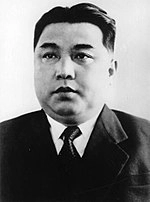How to Pronounce Kim Il-sung
#50
Most Popular
Boost
Apr 15, 1912 Mangyŏngdae, North Korea Died on 08 Jul 1994 (aged 82)
President of the Democratic People's Republic of Korea
AriesKim Il Sung, Date of Birth, Place of Birth, Family, Facts, Age, Net Worth, Biography and More in FamedBorn.com

President of the Democratic People's Republic of Korea
Aries